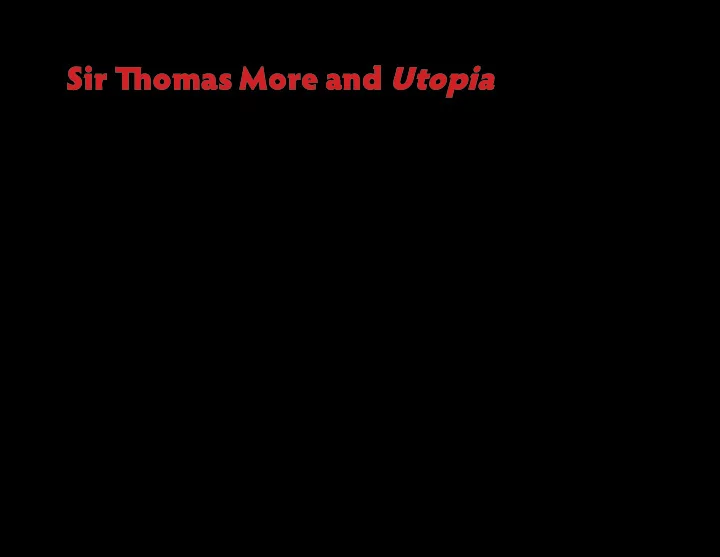

Sir Tiomas More and Utopia 06.18.13 || English 2322: British Literature: Anglo-Saxon — Mid 18th Century || D. Glen Smith, instructor
Utopia-Book 2 Review Book 1 and Book 2. Both sections are shown through fjrst person accounts of events. Book 1: Book2: Primarily concerned with Primarily concerned with English social order Utopian views of society the character “More” narrates story the character Raphael Hythlodaeus and establishes political/social themes narrates his adventures in Utopia, in the full text discussing their views of society establishes England and Europe’s offers a solution to class struggles social / class problems through example of island Utopia 2 06.18.13 || English 2322: British Literature: Anglo-Saxon — Mid 18th Century || D. Glen Smith, instructor
Utopia-Book 2 Soon More, through Hythlodaeus, continues his secondary theme of the evils of idle behavior. By strategies of the Utopian society, “no one sit[s] idle” (746). • Hythlodaeus outlines the typical idlers in Europe on page 747 as a contrast. Part of the vice of idleness includes: gambling, drinking, brothels, and “useless occupations” (748). • The remainder of Book 2 shows through example how a society can reject idle lifestyles and attitudes. • One primary precautionary measure which the Utopians have in place is the fact everyone, men and women, is trained immediately in the pursuit of farming. The society is based primarily as an agricultural culture. 3 06.18.13 || English 2322: British Literature: Anglo-Saxon — Mid 18th Century || D. Glen Smith, instructor
Utopia-Book 2 Aside from this type of political commentary, the majority of this section of Utopia leans closer to fantasy. More creates elaborate details of the daily life of the average Utopian, discussing education, marriage and courtship, family relations, and housing. • his concern at this stage is creating an elaborate background of this fjctional society in order to show its function and mechanism through plot devices— and less about the contrasting politics between England and Utopia • this soon changes once Hythlodaeus acknowledges the existence of slaves • one of the fjrst times they are mentioned is in the section “Social Relations” where Hythlodaeus displays how the food markets are maintained: “Outside the city are designated places where all gore and offal may be washed away in running water. From these places they transport the carcasses of the animals slaughtered and cleaned by the hands of slaves. They do not allow their citizens to accustom themselves to the butchering of animals” (750). 4 06.18.13 || English 2322: British Literature: Anglo-Saxon — Mid 18th Century || D. Glen Smith, instructor
Utopia-Book 2 Notice just after fjrst establishing the “perfect” classless society, he then discloses a major fmaw in their community. The existence of slaves in the plot causes the primary fantasy structure to shift to an overt political/social commentary . • Be sure to note that More is not an advocate of slavery. He is mentioning this practice as a common-place evil in the world. • During the early 1500s slavery as an institution had not yet reached a peak of inhumanity as the American slave trade industry during the early formation of the United States industry. Spanish conquistadors were only just beginning to import populations of African slaves rather than use Native Americans as a resource. • In addition, England would not begin participating in the Transatlantic Slave Trade until the mid 1500s. • At this stage in history, the common accepted belief was if a country conquered another country, the fjrst country had “legal” right to do what they wished to the conquered. “To the victor goes the spoils.” 5 06.18.13 || English 2322: British Literature: Anglo-Saxon — Mid 18th Century || D. Glen Smith, instructor
Utopia-Book 2 In a later section of Book 2, “Slavery, [Etc],” Hythlodaeus discusses the issues of enslavement. The opening paragraph goes into elaborate detail of the condition of these people. • “Prisoners of war are not enslaved unless captured in wars fought by the Utopians themselves [...] Their slaves are either such or such as have been condemned to death elsewhere for some offense. The greater number are of this latter kind. They carry away many of them; sometimes they buy them cheaply ; but often they ask for them and get them for nothing. These classes of slaves they keep not only continually at work but also in chains” (my emphasis, 764). • What was presented earlier in the text is now changed: this utopian society is based on a (although limited) class system: Freeman and Slaves. • As well, among the Slave category itself, an additional hierarchy is created: Acquired Foreign Slaves, Willing Slaves, Criminal Slaves. (See pages 764-765.) 6 06.18.13 || English 2322: British Literature: Anglo-Saxon — Mid 18th Century || D. Glen Smith, instructor
Utopia-Book 2 Utopia is then shown as a fmawed and hypocritical country. The notion of slaves or serfs defjnes an aspect of possession, even if the ownership is restricted to the government itself. • From More’s perspective, although he found a “moral” alternative for the slave trade by placing limits to its functions within a “classless” society— yet, he does this all in order to create an elaborate fantasy to show how an utopia actually cannot function without someone being taken advantage of. • Once you see this intended fmaw in the story’s logic, then, the story cannot function as a formal social political commentary. Once the “perfect” classless society encourages slavery, then the political discourse falls apart in an obvious fashion due to the structure of the plot. • He furthers this by creating an elaborate allegory showing the slaves placed in shackles and chains of gold. 7 06.18.13 || English 2322: British Literature: Anglo-Saxon — Mid 18th Century || D. Glen Smith, instructor
Recommend
More recommend